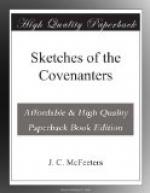6. What did Melville’s faithfulness cost him?
7. What need now to advocate the supremacy of Jesus, and the independence of the Church?
VIII.
Men of might.—A.D. 1596.
Jesus Christ is “the King of glory; the Lord strong and mighty; the Lord mighty in battle.” His servants, filled with the Holy Spirit and devoted to His cause, grow like Him in moral courage and irresistible action. Every age supplies the opportunity for heroic service.
The Church has always had mighty men willing to venture their lives, when religion and liberty were attacked; but at no time has there gone forth a more illustrious band whose heart God touched, than in the last years of the Sixteenth century. The tide of defection was then rolling in upon the Church with desolating violence. The truth of Christ’s supremacy was being submerged beneath the waves of Episcopacy. The right of Christ to rule His Church was disputed by King James, and claimed as his own prerogative. The true servants of God writhed in shame and sorrow, as they saw the diadem of Christ snatched from His brow and clutched by a presumptuous man. The times demanded men who would not quail in the presence of the sceptered monarch; or at his threats of imprisonment, banishment and death. The soldiers of the cross stepped forth. The “threescore valiant men of the valiant of Israel” were there, standing about the king of kings; “every man with his sword on his thigh, because of fear in the night.”
Andrew Melville was chief among the captains in those days. His face was luminous with an inner light; his eye pierced through the countenance of his adversaries; his bearing overwhelmed his enemies with the innate majesty of truth and holiness. What a torrent his electrified soul poured forth when he opened his mouth and protested against the wrongs done to Jesus Christ and the Church! His eloquence was like a rushing river, an irresistible Niagara. Like Knox, it was said, “He never feared the face of man.” In private and in public, in the pulpit and through the press, he reproved kings, princes, judges, and nobles for their sins. He did his best work when he met them face to face. The dishonor done to Christ by denying His royal rights made his blood boil, and fired his soul with vehement love in defence of his Lord and Master. But he suffered for his faithfulness. He was imprisoned; yet four years spent in jail, eating bad bread, breathing foul air, sleeping on a hard bed, groping in the darkness, lonesome in the pest-room, brought him no regret for preaching Christ. From prison he went into banishment, and from banishment, home to heaven. In his last illness he was asked if he desired the return of health. “No, not for twenty worlds,” was his spirited reply.
[Illustration: Edinburgh castle.
The Castle is built on a rock that rises with rugged abruptness 300 feet high. It is inaccessible except on one side, which opens upon the esplanade, on the foreground of the picture. In this Castle, many notable martyrs were imprisoned, and there awaited their execution.]




